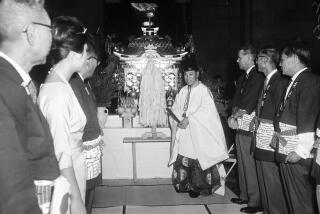THE SEOUL GAMES : Notes : Koreans Await Turn in Village
- Share via
SEOUL — Some South Koreans are waiting eagerly for everyone to leave town.
Then they can move into apartments where Olympic athletes such as Chris Evert and Michael Gross stayed during the Summer Games.
The Olympic Village--a high-rise complex in southern Seoul--will become home to 5,540 Korean families once the Games end and refurbishing is completed at the end of December.
To be eligible to buy an apartment in the village, Koreans first had to buy 40 billion won--$57 million--in Olympic bonds from the city of Seoul.
But the city’s real estate boom sent prices soaring. Officials say that each apartment is now worth several hundred thousand dollars--eight to nine times the price when the apartments were put on sale.
Seoul, like most burgeoning cities in the world, is experiencing a serious housing shortage for its 10 million citizens.
All 5,540 apartments were sold by last March, long before the 122 high-rise buildings were completed at a cost of more than $335 million.
Hi, Mom. Send money: In the writing-home department, Australia and Canada take top honors among the Olympic athletes and team officials using the Olympic Village post office.
The post office reported that one Australian official sent 2,340 post cards and a Canadian posted more than 4,750 letters. By Sept. 28, more than 100,500 customers had mailed more than 183,000 cards and letters.
Time for fairness: Athletes who had little or nothing to spend on souvenirs while in Seoul for the Games are not going home empty-handed.
The Ministry of Transportation has given Korean-made wristwatches to 811 athletes and officials from 42 developing countries. A ministry spokesman said the watches were made available to those from countries whose per-capita income is less than $500.
Business is developing: Kodak estimates that its film processing center for accredited photographers covering the Games will have processed more than 100,000 rolls of film and made more than 60,000 8 x 10 prints by today.
In contrast, spokesman Dan Matthaidess says Kodak handled 60,000 rolls at the Winter Games in Calgary.
Last add Johnson: Sprinter Ben Johnson, maintaining his innocence in a drug scandal that forced Olympic officials to take away his gold medal, said in a published report that he turned down a lucrative offer from a foreign magazine so he could give Canadians a first-hand account of the controversy.
Johnson, who lost his medal for the 100-meter dash after testing positive for an anabolic steroid, told the Toronto Sun that he “never took any banned substances.”
Johnson said he received anti-inflammatory cortisone shots from his doctor, Dr. Jamie Astaphan, days before running the 100 meters a week ago in a world-record time of 9.79 seconds.
He said the only other medication he took was a concoction of sarsaparilla and ginseng root, which he said was fixed by Astaphan and taken throughout training and in Seoul.
More to Read
Go beyond the scoreboard
Get the latest on L.A.'s teams in the daily Sports Report newsletter.
You may occasionally receive promotional content from the Los Angeles Times.






